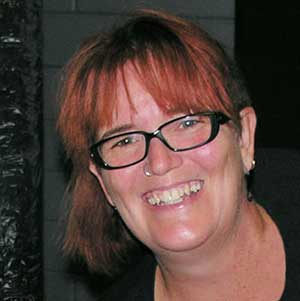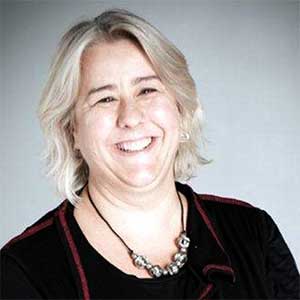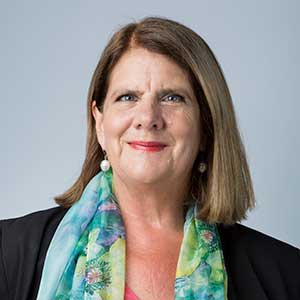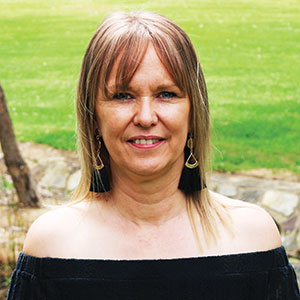“Ok, so you’re in jail. You’re probably freaking out right now but it’s going to be okay.”
For a new inmate, those words provide a lifeline as the prison cell door slams shut, cutting ties with the outside world.
Afraid, confused, even terrified. These are typical feelings experienced by ‘first timers’, but thanks to a new initiative being driven by the University of South Australia, the induction process may soon become a little less daunting.

A prison radio project led by UniSA journalism lecturer Dr Heather Anderson is giving inmates at Mobilong Prison
and Adelaide Women’s Prison a creative outlet and also helping ‘newbies’ transition into life behind bars.
In an Australian first, Dr Anderson and Dr Charlotte Bedford from the University of Adelaide are training prisoners in radio production, developing a series of audio recordings to help inmates navigate the stresses and unfamiliarity of prison life.
The pilot project at Mobilong in 2017 resulted in a 50-minute CD, covering several themes, including practical tips on the basics of prison life, staying fit and healthy, joining a peer support program and even a humorous piece on what makes a good cell mate.
Based on the positive feedback from “Mob Radio”, the SA Department for Correctional Services has funded a similar UniSA project in 2018 for the women’s prison, with slightly different themes.
“Providing emotional support is a major priority in these audio recordings,” Dr Anderson says.
Some of the tips cover advice on aspects of the induction process that new inmates haven’t considered: things like writing down key phone numbers to take into prison and how to organise visits from family.
Practicalities aside, the goal is to both support prisoners and provide them with a creative outlet in an otherwise sterile, regimented environment.
“It’s modelled on a successful radio project in the United Kingdom launched 10 years ago to curb the high rates of self-harm and suicide among prisoners and to give a voice to a silent community isolated from society,” Dr Anderson says.
Using creative projects to transform prisoners’ lives is also being explored by UniSA’s Match Studio, a learning space where teams of students and researchers develop innovative solutions to real-world challenges, in a series of different programs.
Prison-made products to benefit community

UniSA Social Work students and Match Studio director Dr Jane Andrew are working alongside inmates at the Adelaide Women’s Prison to develop four creative models: an ‘Inside Out Kitchen’; a Design and Make Program; a Pop-Up Shop; and a Mentor Program to encourage startups.
“The work we are doing helps prisoners from the beginning of their sentence, rather than just thinking about rehabilitation as they are nearing the end of their jail term. If we can support prisoners from day one, evidence shows they are less likely to reoffend,” she says.
A creative thread runs through each program, connecting existing industry programs to teach inmates skills they can use at the completion of their sentence such as textiles, welding, furniture making and other industries.
“The female prisoners working with us on the pilot Design and Make project will have a degree of creative autonomy in the textiles workshop in an environment that normally deprives people of this,” Dr Andrew says.
“They will be designing and making a range of prison products, learning skills in numerous industries that can be transferred to the outside world on their release.”
A Pop-Up Shop program will teach female inmates specific retail sector skills, improving their literacy and numeracy levels which are lower than average, making the task of finding employment even more challenging.
These shops will be embedded in local charity stores, selling prison-made products with the proceeds going to the community.
“This all helps boost prisoners’ self-esteem, provide an outlet for the high volume of products – particularly art and crafts – made in prison and also create industry links while breaking down the barriers and stigma that people in prison face,” Dr Andrew says.
Again, many of these programs are modelled on the success of UK prison-based social enterprises, most notably The Clink restaurant chain, the charity Startup, which helps female ex-offenders into self-employment, and US food truck business Drive Change, which trains and hires ex-prisoners.
Reoffending rates for the 800-plus prisoners who have graduated from The Clink program are 41 per cent lower than for the general prison population, a statistic which Match Studios hopes to replicate with its South Australian program.
It’s a similar story with Startup entrepreneurs whose recidivism rates sit at five per cent compared to 65 per cent for ex-prisoners in the UK.
Countering negative stereotypes through art
Criminology PhD candidate Jeremy Ryder is helping South Australian inmates nurture their creative side through Art by Prisoners, an annual exhibition of artworks created within the State’s adult prisons.
This year’s exhibition was displayed at UniSA’s Kerry Packer Civic Gallery in August, revealing fragments of prisoners’ lives both within and beyond prison.
"Art gives inmates the opportunity to be visible in ways that challenge popular negative stereotypes about people in prison,” says Ryder, who also works for the Department for Correctional Services.
“It’s a way of fracturing their criminal identity, giving them social capital, boosting their self-esteem and expressing themselves on canvas. Through their art, they can address the pain of imprisonment in a visual way and people can start to understand the issues that prisoners are grappling with, such as addiction, loneliness and isolation.”
Ryder, who is collaborating with Match Studio as an academic mentor, says the Western world is experiencing huge growth in prison numbers, making it harder to incite public sympathy for offenders.
“In a way, we are countering the ‘tough on crime’ rhetoric through art because it has a layer of moral goodness.
“Match Studio is taking this concept a step further, helping to develop a cottage creative industry in prison to create products and skills that travel beyond the prison walls.”
Education leads to a better life
It’s no secret that Aboriginal Australians have much higher incarceration rates than the general population, but UniSA is also providing a window of hope and opportunity for these prisoners.
Through its Aboriginal Pathway, Diploma and Foundation Studies programs, UniSA College is supporting prisoners and those newly released to break a cycle of crime and impoverishment through education.

“Our no-fee programs are designed primarily for people who don’t have Year 12 qualifications but want to make something of their lives and contribute to society,” says the academic director of UniSA College, Associate Professor Deirdre Tedmanson.
“Education is profoundly important in the rehabilitation of prisoners. It is not just about gaining knowledge and skills for a job and a productive life; it is also vital for a person’s social and emotional wellbeing,” she says.
“For people who are repeat offenders, many of them are from low socioeconomic backgrounds and many also have a history of enduring trauma through domestic violence, with few positive role models.
“By providing access to education, we are also focusing on dignity, a connection to the community and raising people’s confidence and self-esteem – all pathways to sustainable lives,” she says.
One standout example is former inmate Linda Fisk, who was jailed for nine years in 1991. Fisk, who left school at 14, has paid her dues to society.
She sat UniSA’s Special Tertiary Admissions Test in 2013 and, earlier this year graduated with a Bachelor of Psychological Science. She has also established an organisation called Seeds of Affinity to support women who have served time in prison.
Interestingly, many former prisoners who pursue higher education on release are drawn to courses relating to human behaviour and social work.
“People are focused on giving back to their communities and working in areas where they have lived experience,” Assoc Prof Tedmanson says.
UniSA College is now seeking industry partners to sponsor ex-prisoners to pursue educational and work opportunities.
“Education is a fundamental right and it gives people hope. We’re proud to lead the way in South Australia in this space; hopefully we can bring others on board,” she says.
Education the key to turning around ex-prisoners’ lives
“The biggest obstacle in turning your life around is lack of opportunity. With education and self-confidence, anything is possible.”

Five years ago, Fiona Woollard’s home was Adelaide Women’s Prison. Today she is at the end of her third year of a Bachelor of Social Work at UniSA, hoping to inspire other women whose lives have slipped off course.
“I was a pretty poor student at school, only just completing Year 12 due to my parents pushing me,” Fiona says.
“While in prison I started a Certificate II in Women’s Education just to fill in time, but my confidence grew and with the encouragement of other women in similar circumstances, I completed it after I was released.”
Thanks to the support of Seeds of Affinity, an organisation which helps women transition into the community
after prison, Fiona went on to study at Port Adelaide TAFE, graduating with a Certificate IV in Women’s Education.
Using her TAFE qualification as a pathway into university, she applied for a Bachelor of Social Work – “a degree I thought would assist me in making changes not only to my own life, but to many other women who have been through the criminal justice system”.
Fiona is just one year away from securing those three special characters after her name signifying her degree qualifications – BSW – an achievement that seemed impossible four years ago.
Her message to other women in prison who can’t see a path forward is to surround yourself with positive and supportive people who believe in you.
“Education is the beginning of what can lie ahead if you take the opportunities presented to you. With hope and encouragement, anything is possible.”
And to wider society she cautions that rehabilitation within four walls is extremely difficult to achieve.
“Most women inside prison are too nervous and anxious about opening up in such an environment, afraid of leaving themselves vulnerable in a place and system that is not supportive,” she says.
“Rehabilitation is best done in the community but for that to happen, women with lived prison experience need acceptance and support, free of judgement and stigma. They need to feel a sense of belonging and a chance to find a sense of self in their communities.”